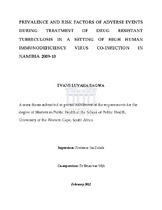| dc.description.abstract | Namibia is currently coping with a dual burden of human immunodeficiency (HIV) and HIV-associated tuberculosis (TB). In 2010, HIV prevalence was 18.8%, the TB case notification rate was 634 per 100,000 population, while TB/HIV co-infection was 58% in 2009. There were 372 reported cases of drug-resistant TB (DR-TB) in 2009. This study assessed the prevalence, profile and outcome of adverse events (AEs) associated with the treatment of DR-TB, and risk factors for the adverse events. The researcher used a cross-sectional design. Data was collected from the treatment records of all patients treated for DR-TB (N = 59) at the study facility between January 2008 and February 2010. Descriptive statistics were used to describe the frequency of the adverse events and logistic regression to analyse the association between possible risk factors and (specific) adverse events, with stratification (sub-group analysis) and multivariate analysis to adjust for measured confounders. Results of logistic regression analysis are reported as odds ratio (OR), 95% confidence interval (CI) and p-value, where p<0.05 was considered to be statistically significant. A total of 141 adverse events were experienced by 90% (53/59) of patients in the sample. HIV-associated TB occurred in 31 (53%) of the sample. The prevalence of gastrointestinal tract (GIT) adverse events was 64%, tinnitus 45%, joint pain 28% and decreased hearing 25%. Abdominal pain, rash, nausea, decreased hearing and joint pain were found to be more common in people living with HIV than in HIV-negative patients. Moderate-to-severe adverse events were mostly experienced after four weeks of DR-TB treatment (OR 6.4; 95% CI 1.6 – 25.6, p= 0.01). Drug-resistant TB patients who were coinfected with HIV were more prone to experiencing three or more adverse events (OR 3.9; 95% CI 1.2 – 13.6, p= 0.03). Patients treated with zidovudine-based ART were at an increased risk of experiencing nausea (OR 7.5; 95% CI 1.1 -51.5, p=0.04). Females were associated with an increased risk of skin rash (OR 15.7; 95% CI 1.7 – 143.7, p=0.01). The use of cycloserine-based DR-TB regimens was associated with joint pain (OR 6.5; 95% CI 1.6 – 25.8, p=0.01), while the risk of ototoxicity was associated with the use of amikacin-containing regimens (OR 12.0; 95% CI 1.3 – 111.3, p=0.03). Adverse events were found to be more common among patients treated for DR-TB (90% prevalence), particularly during the intensive phase of TB therapy. Most of these adverse events were mild and tolerable. Some adverse events were more common among DR-TB patients who were co-infected with HIV than in HIV-negative patients. The characteristics and risk factors of the serious adverse events need further research. The use of cycloserine-based DR-TB regimens was associated with joint pain. Findings of the risk factor analysis are inconclusive because of the small sample size, which severely limited the power of the study. Clinicians should invest more time in the prevention and management of adverse events, and should pay greater attention to the needs of HIV co-infected DR-TB patients who are using second-line anti-TB medications, especially those who are concomitantly undergoing treatment using antiretroviral medicines. | en_US |

